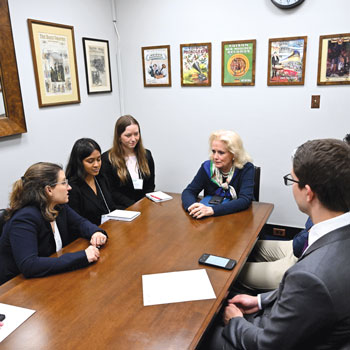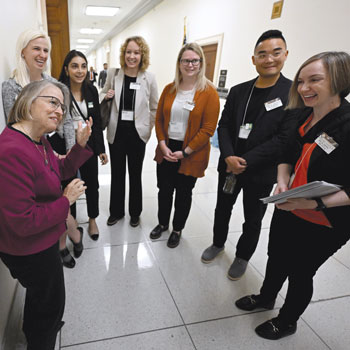Making the rounds in the halls of Congress
Hundreds of ACP member physicians advocated for internal medicine at the annual Leadership Day.
Doctors from across the country got a taste of the legislative process and a lesson in lobbying 101 at ACP's annual Leadership Day, held in May in Washington, D.C. At the event, hundreds of ACP members descended on the nation's capital to push for legislation on issues affecting the medical workforce and patient care.
Shari Erickson, MPH, ACP's Chief Advocacy Officer and Senior Vice President of Governmental Affairs and Public Policy, reminded attendees that unity was the theme of the day. “It's a strength. When there's teamwork and collaboration, wonderful things can be achieved.”

The physicians, medical students, and residents had their goals set out for them and were tasked with counseling legislators and their staff on three of ACP's policy priority issues. These included cosponsoring and passing H.R. 2630/S. 652, the Safe Step Act of 2023; H.R. 2389/S. 1302, the Resident Physician Shortage Reduction Act of 2023; and H.R. 6545, the Physician Fee Schedule Update and Improvements Act.
The three bills call for group health plans to provide an exception process for medication step therapy protocols, an increase in the number of Medicare-supported graduate medical education (GME) positions, and a higher threshold for implementing budget-neutral payment cuts from $20 million to $53 million, respectively.
Ms. Erickson reiterated talking points and underscored key issues driving the legislation. “The first one is around reducing administrative burden in medicine, or [putting] patients before paperwork,” she said. The other bills will help bolster compensation for physicians and support programs that strengthen the physician workforce. “It's estimated that there will be a shortage of potentially 40,000 primary care physicians in 2030,” Ms. Erickson said.
Before they made their case to lawmakers, the 480 attendees learned some best practices from lobbyists, staffers, and representatives themselves. When it comes to advocacy, “it is all about building power,” Dan Smith, founder and president of strategic consulting firm AdvocacySmiths, told attendees.
“When you think about advocacy, you're thinking about getting more people, more organizations, more folks as part of your cause because that's the only way you bring about change,” he said.
According to the Leadership Day speakers, there are a few ways to maximize the relatively short time allotted for lobbying meetings. One is to perfect storytelling. Painting a picture for lawmakers of specific instances with patients that exemplify why change is needed allows them to visualize how the bills will help their constituents, experts explained.
“The things you actually remember are people who come in and tell you a personal story,” Mr. Smith said.
Attendees were also advised to follow up with lawmakers and staffers after the meeting to keep the issues top of mind. “[Members] care about what their voters think about issues, and if enough voters are talking to them, they're picking it up,” Mr. Smith said. “Another thing that's really important is the power of information. And because you are physicians and you bring such credibility, tell them something they don't know.” He noted that while personal stories are effective, it's also important to have some facts up your sleeve.
Later, David Pugach, JD, Vice President of Governmental Affairs and Public Policy at ACP, took to the stage to lay out just how effective advocacy can be.
“The conversations that you're all going to be having tomorrow, the follow-up that you can do, the online grassroots advocacy, really does move these issues forward, because when there is so much noise, so much activity, thousands of bills getting introduced, and very few—2% at the end of the two-year cycle—that are actually signed into law, these meetings go a really long way,” he said.
In total, among the 370 meetings conducted with congressional offices, physicians were scheduled to meet directly with 86 lawmakers and have 114 meetings with senior congressional staff.
After providing feedback on mock meetings and participating in a panel Q&A with congressional staffers, attendees heard lobbying tips firsthand from Sen. Roger Marshall, MD (R-KS), and Rep. Debbie Dingell (D-MI).
“Tell your story, OK? Don't get in the weeds,” Senator Marshall said. “This is a relationship game.”

Although advocacy on the Hill is effective, “leave here with what you've learned, and do advocacy day at home too,” Rep. Dingell told attendees before they headed to their meetings. “Get those members and those senators to come visit you. You all need to put that human face on what you're going through, what your struggles are, how hard it is for you to deliver the care that you want,” she said.
Physicians put their knowledge into action in one meeting with Christiana Reasor, health policy advisor for Sen. Jerry Moran (R-KS).
Benjamin Quick, MD, FACP, an internal medicine physician at The University of Kansas Health System in Overland Park, outlined the importance of passing the Physician Fee Schedule Update and Improvements Act by explaining that some practices currently restrict the number of Medicare patients they can see each day. “I feel frustrated for the members in the plan,” he said.
Some practices don't see Medicare patients anymore because the reimbursement rates are so low, added Ky Stoltzfus, MD, FACP, a palliative care physician at The University of Kansas Health System.
For the practices that do see Medicare beneficiaries, the patients tend to be sicker and need more care, Dr. Quick said, again underscoring the pitfalls of low reimbursement rates.
“We're at the point where everyone's realizing something needs to change,” agreed Ms. Reasor. She thanked the members for raising awareness of the issues, adding “knowing the bills that are helpful is useful for us.”
At another meeting later in the day, physicians from Michigan sat down with Rep. Dingell.
“There's [physician] shortages everywhere,” Allison Ruff, MD, FACP, a primary care physician at University of Michigan Health in Ann Arbor, told the congresswoman. “I've had patients that drive four hours to see me.”
Dr. Ruff and other physicians explained how they've faced situations where hospitalized patients are unable to receive timely follow-up care after discharge. This creates problems as patients aren't being adequately monitored for potential medication side effects, among other issues. But the physician shortage is especially dire in primary care, they stressed.
Rep. Dingell agreed the problems are pressing. “These are all issues I support,” she said, adding that “if you can build that grassroots momentum,” change can happen.



